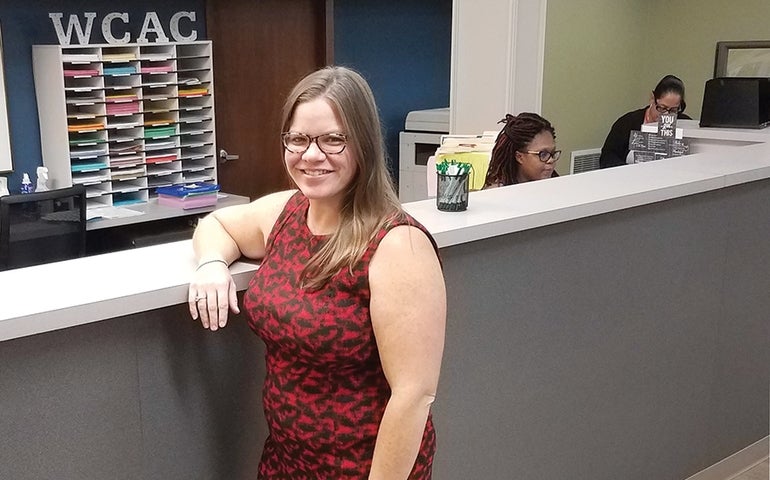In June, Marybeth Campbell took over leadership of the Worcester Community Action Council from Jill Dagilis, who ran the nonprofit for 13 years. Campbell joined from the workforce development nonprofit Skillworks in Boston. What attracted you to WCAC? A big part of me wanting to take on this job was Jill Dagilis, who is a […]
Get Instant Access to This Article
Subscribe to Worcester Business Journal and get immediate access to all of our subscriber-only content and much more.
- Critical Central Massachusetts business news updated daily.
- Immediate access to all subscriber-only content on our website.
- Bi-weekly print or digital editions of our award-winning publication.
- Special bonus issues like the WBJ Book of Lists.
- Exclusive ticket prize draws for our in-person events.
Click here to purchase a paywall bypass link for this article.
In June, Marybeth Campbell took over leadership of the Worcester Community Action Council from Jill Dagilis, who ran the nonprofit for 13 years. Campbell joined from the workforce development nonprofit Skillworks in Boston.
What attracted you to WCAC?
A big part of me wanting to take on this job was Jill Dagilis, who is a great professional mentor to me as a woman in leadership.
The most important thing, though, was getting to do this work that I loved in my most favorite city, where I was born and raised. Finally being able to come home and live out my family DNA working in the public service sector is a great way to give back.
How has the transition been?
I had the advantage of being a board member for three years. I chaired the program committee, so I knew the programs and staff fairly well.
My entire career had been in Boston, and the first 12 years of my career were in the energy space, working in the legislature for a Worcester representative – John Binienda – and then I migrated over to the energy work at the Massachusetts Technology Collaborative and the Mass. Clean Energy Center. That work maps very clearly onto the work WCAC does in our energy programs.
Then I transitioned into the former Gov. Deval Patrick Administration to focus on workforce development issues. That work maps very well onto WCAC’s Jobs & Education Center.
What is your vision for WCAC?
It is still a work in progress in shaping the vision with all our staff. We just initiated a strategic planning process to take up through fiscal 2021 to fiscal 2023. That will be a great tool to organize our governance, fiscal responsibilities and mechanics of how we achieve goals in our programs.
I would like to bring an identity and narrative to shift where we are in the public realm on the challenges we face in the social-political-economic climate.
How do you change that perception?
We often orient our participants and our work in a very deficit narrative, and we need to shift that into a more asset-building narrative. Our participants and our expert staff really should be seen as real assets in the economy. We support people to be more mobile in the economy, and our staff should be seen as the experts in the region.
We are the conscience of anti-poverty issues in the region.
We need to revisit how we talk about ourselves. We will bring research to the table on the issues of poverty, whether collaborating with others or doing the research on our own.
The advantage of being in south Worcester County is there is tremendous growth happening here, but it is important to have a strong voice advocating for those who are not fully participating in that growth.
What specific work do you do?
We have three major impact areas.
The largest and one reaching the most is in our energy program, where we provide low-income heating assistance, which services about 15,000 people each year. We have a complementary weatherization program as well. Most of the staff you see in the Worcester office are working on the energy programs.
We also have the education and employment programs. We work with all ages, and we have programs like this past summer where 316 youth received six-week internships.
Our third bucket is our children and families programs, where we have our Head Start and our Early Head Start programs. We focus a lot on the first 1,000 days of a child’s life, making sure they have everything they need to be successful. We do a lot of that work from Webster and Southbridge.
What is WCAC’s revenue?
Our funding is mostly through state and federal contracts, which total between $22 million and $25 million each year. We have a great staff who stay on top of the grant applications.
Fortunately, Jill Dagilis left me in great hands with great senior leadership, excellent employees, an engaged board, and a strong direction for the organization.
You are the fifth WCAC director in 55 years. That means the average tenure is about 14 years.
That is my plan, to stay around for at least that long. I feel very fortunate to be leading such an amazing agency.
This interview was conducted and edited for length and clarity by WBJ Editor Brad Kane.

